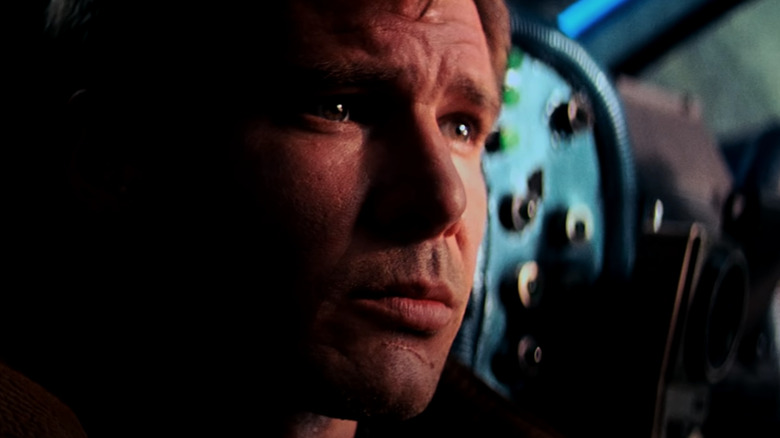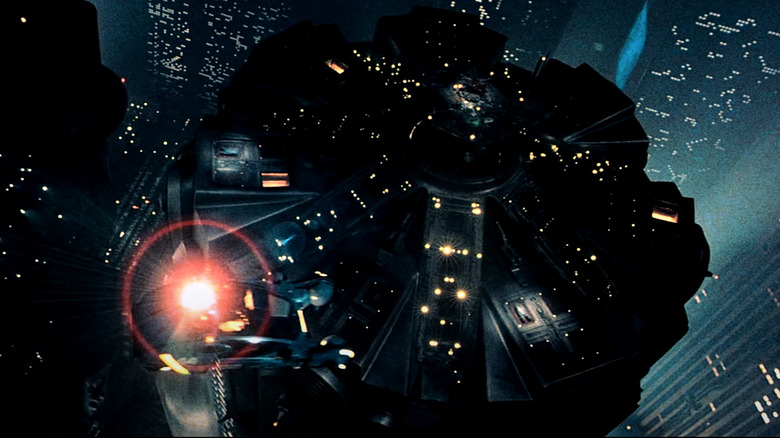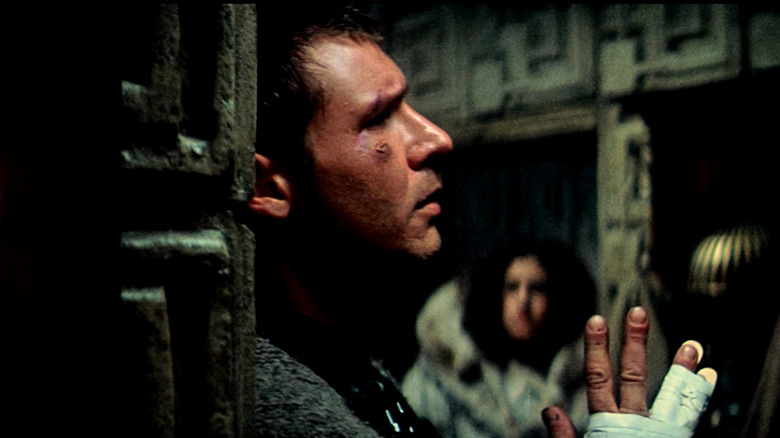Time Hasn't Made Harrison Ford Any Fonder Of Ridley Scott's Blade Runner
Since "Blade Runner" first debuted in 1982, Harrison Ford hasn't held back when it comes to critiquing the movie — and time hasn't softened the Hollywood vet. When he's not being grumpy about his role in Star Wars, the star of Ridley Scott's now-celebrated dystopian vision of 2019 Los Angeles has gone on record about his distaste for some of the choices made in "Blade Runner." Whether it be the studio-mandated voice-over track that was hastily added following disappointing test screenings, or the equally rushed happy ending inserted by Scott prior to the theatrical cut's release, Ford has many criticisms of "Blade Runner."
Both audiences and critics initially shared some of the star's distaste. "Blade Runner" opened to $6 million but failed to make much of a commercial impact beyond that and was derided by some critics who, in the wake of family friendly sci-fi outings such as Spielberg's "E.T." seemed baffled by Scott's dimly lit neo-noir. Of course, the film would develop a cult following in the '90s and eventually become a celebrated entry in the sci-fi genre, inspiring Denis Villenueve to direct the 2017 sequel "Blade Runner 2049." But that hasn't stopped both Scott and Ford offering various explanations for the film's initial struggles.
'Were they all on drugs?'
In fact, as recently as the 2021 Oscar ceremony, the "Blade Runner" leading man addressed the film's issues once again. As Newsweek points out, Ford had some editing notes that he shared at the event, and he didn't hold back.
Speaking at the 93rd Academy Awards, the actor revealed some "editorial suggestions" prior to announcing the nominees for the Best Editing Oscar. After decrying Blade Runner's "choppy opening," Ford went on to once again critique the infamous voice-over track, saying that his character, Rick Deckard, "sounds drugged." He went on to reveal a list of specific gripes with the movie:
"Were they all on drugs? Dekker at the piano is interminable. Flashback dialogue is confusing. Is he listening to a tape? Why do we need the third cut to the eggs? The synagogue music is awful on the street. We've got to use Vangelis. Up to Zhora's death, the movie is deadly dull. This movie gets worse every screening."
Ford rounded out his comments by highlighting the difficulties faced by editors who have to "make thousands of choices" during the laborious process of cutting a film together. And while the actor clearly hasn't softened all that much on "Blade Runner," he at least acknowledged the problems faced by editors and how that can impact a film, which suggests he's not all that bitter about the movie.
Does Harrison Ford really hate Blade Runner?
Though never truly becoming a mainstream hit, "Blade Runner" has undoubtedly developed a reputation as one of the defining cyberpunk movies — even if Ridley Scott doesn't think of it as a sci-fi film. Since its initial release, "Blade Runner" has undergone several revisions, with a 1992 director's cut and a 2007 "Final Cut" — helping define the film as a hugely influential movie that regularly appears in lists of the greatest films of all-time, including at number 16 in Empire's recent top 100 list.
With all this in mind, Ford's aforementioned comments seem designed more to highlight the irony of such a celebrated film initially facing such a hostile reception. With his highly specific suggestions for swapping out "synagogue music" and the "third cut to the eggs," the "Indiana Jones" star seems to be poking fun at the intricacies of editing and how movies can be both misunderstood and often undermined by small but significant choices made in the editing room.
What's more, "Blade Runner 2049" director Denis Villenueve has spoken about working with Ford on the sequel, hinting the actor does have love for the Deckard role and the project as a whole. The "Arrival" director previously told The Hollywood Reporter that he could feel Ford's "passion" for the role and that the actor's "fire was still there." All of which suggests that while the notoriously grumpy actor may well still harbor some resentment for the initial issues faced by "Blade Runner," at heart, he's got a soft spot for the movie that helped launch his career.


